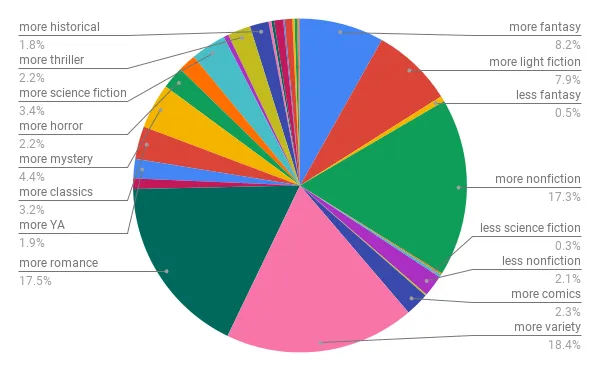
Pandemic Reading Habits Survey Results
Two weeks ago, we asked readers to answer a series of questions about how the pandemic had (or had not) changed your reading habits and preferences. Over 5,000 of you answered (5,117 to be exact), so we’ve got quite a good chunk of information to share! Here are the results.
Has the Amount You’re Reading Changed?
More than half of you, 58.4%, said you’ve been reading more since the pandemic. 18.2% say you’re reading less, and 23.3% say your reading amount hasn’t changed. We didn’t ask why people gave the answers we did, but since so many people had more time between stay-at-home orders and less commuting, along with a need for a bit of escapism, the big increase makes sense.
Has the Length of Books You’re Reading Changed?
Most of you — 70% — said you’re reading the same book length as usual. 14.7% said you’re reading longer books (which scans with the increase in nonfiction and fantasy we’ll see later), and 15.1% said you’re reading shorter books.
Has Where You’re Getting Books From Changed?
- 1,585 of you, or about 31%, said you’re buying more books from independent bookstores
- 552 of you, or about 11%, said you’re buying more books from chain bookstores (Barnes and Noble, etc)
- 1,389, or about 27% of you, said you’re buying more books from Amazon (interesting that this is about equal to the indie bookstore uptick)
- 900 of you, or about 18% said you’re buying more books from used bookstores
- 227, or just 4% said you’re buying more books from big box stores like Target and Costco
- 832 of you, or 16%, said you’re now buying your books from another option not listed. Indie bookstores and Amazon are the big winners here.
What Happened To Your Book Clubs?
217 of you, or about 4%, disbanded your book clubs entirely during the pandemic. 328, or 6%, paused your book club meetings but plan to get back to it when it feels safe to do so. For those who took their book clubs virtual, 9% of you (476 people) will keep them virtual and 15% have returned to in-person meetings. 56 of you, or 1%, never stopped meeting in person, which is a choice.
Did Your Reading Format Change?
Quite a large number of you — 47% — said you changed reading formats during the pandemic. Let’s break that down:
- 22% (1,149) are listening to more audiobooks vs. 4% who are listening to fewer
- 29% (1,479) are reading more ebooks vs. only 2% who are reading fewer
- 11% (573) are reading more physical books vs. 11% who are reading fewer
What About Library Usage?
When asked if you were using your public libraries more or less during the pandemic, 28% said you were using it more, 25% said you were using it less, and 47% said you were using it about the same. A further breakdown:
- 25% of you said you were using the library more and would continue to do so
- 6% said you were using it more, but would stop when you could
- 32% of you said you didn’t use your library before, and won’t in the future
- 37% of you said you didn’t use your library before, but will in the future
Changes in Your Genre Choices
When asked if the genre of books you’re reading has changed during the pandemic, 33% of you said yes. That breakdown is interesting:

As you can see, “more variety,” “more romance,” and “more nonfiction” are basically tied for the biggest changes in genre choices. The nonfiction entries mentioned specifically reading more memoirs, investigative political works, and antiracism books. The next rung is a tie between “more fantasy” and “more light fiction” — light fiction being a catch-all for keywords like “optimistic,” “happier,” “not so dark,” “beach reads,” and “lighter books.” Not really a genre per se, but definitely a tone people were searching for. If you combine people who read more mysteries and those who read more thrillers, that group is also close to the fantasy/light fiction cohort at 6.6%.
It’s also interesting that twice as many people sought out fantasy as did science fiction (perhaps because sci-fi includes dystopias, which people were pointedly avoiding). And to the brave 2.2% who picked up more horror: we salute you.
And that’s it! Thank you to everyone who participated.